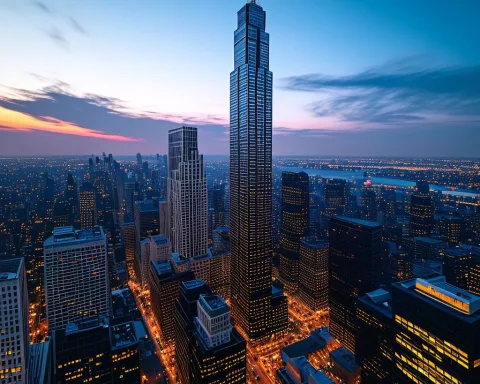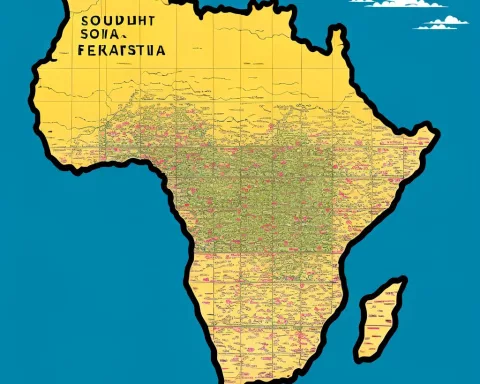Cape Town has become South Africa’s wealthiest city with a growth rate of 10% over the past decade, defying the trend seen in Johannesburg. The city’s stunning natural beauty, lifestyle, and thriving tourism and tech industries are contributing factors to its economic rise. Recent trends show that Cape Town is gradually closing the gap with Johannesburg and is set to surpass it as the country’s wealthiest city by 2040. The migration of wealth towards coastal cities, driven by the allure of ocean living and a more relaxed lifestyle, is a key trend shaping South Africa’s financial landscape.
What is South Africa’s wealthiest city?
Cape Town has rapidly ascended to become South Africa’s wealthiest city, defying the trend seen in Johannesburg with a positive growth rate of 10% over the past decade. This growth is attributed to Cape Town’s stunning natural beauty, lifestyle, and thriving tourism and tech industries. According to the Africa Wealth Report 2023, recent trends indicate that Cape Town is gradually closing the gap with Johannesburg and is set to surpass it as the country’s wealthiest city by 2040.
South Africa boasts a colorful array of cities, each with their own distinct charm and economic dynamics, creating an interesting overview of the country’s financial centers. Examining the distribution of wealth and the growth rates of millionaire populations over the past decade reveals an intriguing pattern. Recently, Cape Town has been rapidly ascending to become South Africa’s wealthiest city.
Johannesburg’s Sluggish Growth
Long regarded as the nation’s financial capital, Johannesburg has seen a relatively slow wealth growth rate over the past ten years, experiencing a 40% decline. Despite its millionaire population increasing to 14,600, the trend of coastal semigration has significantly contributed to its sluggish growth. A growing number of wealthy individuals are choosing coastal living, investing in properties outside of Johannesburg.
Cape Town’s Rapid Expansion
On the other hand, Cape Town has witnessed an impressive increase in its millionaire residents, totaling 7,200. The city has defied the trend seen in Johannesburg with a positive growth rate of 10% over the same period. The driving forces behind this growth are attributed to Cape Town’s stunning natural beauty, lifestyle, and thriving tourism and tech industries.
Wealth Distribution in Other Urban Centers
Durban, South Africa’s third-largest city, is home to 3,600 millionaires. Despite facing economic challenges in the past decade and experiencing a wealth growth rate of -6%, it has maintained a strong base of affluent residents. The beautiful Cape Winelands and the Garden Route regions have both seen significant growth in their millionaire populations, boasting 3,400 and 3,000, respectively. Fueled by their scenic landscapes, vineyards, and tourism, these areas have enjoyed wealth growth rates of 18% and 22%.
Pretoria, another important urban center in South Africa, is struggling with a decline in wealth growth, standing at -35%. Home to 2,400 millionaires, internal migration trends have negatively affected its economic performance. On the smaller side, the Whale Coast region has shown an impressive growth rate of 25% in its millionaire population. With 1,100 millionaires, this coastal paradise is attracting an increasing number of wealthy residents.
Cape Town’s Ascent and Future Prospects
According to the Africa Wealth Report 2023, recent trends indicate that Cape Town is gradually closing the gap with Johannesburg. The ongoing internal migration wave, driven by the appeal of coastal living, has positioned Cape Town as the prime destination for South Africa’s affluent population. If these trends continue, Cape Town is set to surpass Johannesburg as the country’s wealthiest city by 2040.
Cape Town’s burgeoning industries have played a vital role in its rise to prominence. The city’s flourishing tourism sector, with an abundance of attractions and experiences, has proven to be a strong draw for both domestic and international travelers. Furthermore, Cape Town has established itself as an innovation and investment hub, particularly within the tech industry, further strengthening its economic standing.
The Coastal Wealth Migration Trend
One key trend shaping South Africa’s financial landscape is the migration of wealth towards coastal cities, motivated by the allure of ocean living and a more relaxed lifestyle. This phenomenon is also observable in other parts of the world, as more people seek to escape the hustle and bustle of urban centers.
As South Africa’s cities continue to evolve and change, it will be fascinating to see how their unique attributes shape their economic paths. The country’s diverse array of urban areas, each with their own distinct personality and appeal, offers a captivating story of wealth, growth, and opportunity.
In other news, Kholeka Gcaleka has been appointed as the new public protector.
What factors have contributed to Cape Town’s economic rise?
Cape Town’s stunning natural beauty, lifestyle, and thriving tourism and tech industries have contributed to its economic rise. Its flourishing tourism sector, with an abundance of attractions and experiences, has proven to be a strong draw for both domestic and international travelers. Additionally, Cape Town has established itself as an innovation and investment hub, particularly within the tech industry, further strengthening its economic standing.
How has Johannesburg’s wealth growth rate compared to Cape Town’s over the past decade?
Johannesburg has seen a relatively slow wealth growth rate over the past ten years, experiencing a 40% decline. Meanwhile, Cape Town has defied the trend seen in Johannesburg with a positive growth rate of 10% over the same period.
How many millionaires live in Durban?
Durban is home to 3,600 millionaires.
What is the millionaire population of Cape Town?
Cape Town has a millionaire population of 7,200.
How have the Cape Winelands and Garden Route regions performed in terms of wealth growth?
The Cape Winelands and Garden Route regions have both seen significant growth in their millionaire populations, boasting 3,400 and 3,000, respectively. Fueled by their scenic landscapes, vineyards, and tourism, these areas have enjoyed wealth growth rates of 18% and 22%.
How many millionaires live in Pretoria?
Pretoria is home to 2,400 millionaires.
What trend is shaping South Africa’s financial landscape?
The migration of wealth towards coastal cities, driven by the allure of ocean living and a more relaxed lifestyle, is a key trend shaping South Africa’s financial landscape.
When is Cape Town set to surpass Johannesburg as South Africa’s wealthiest city?
According to the Africa Wealth Report 2023, recent trends indicate that Cape Town is gradually closing the gap with Johannesburg and is set to surpass it as the country’s wealthiest city by 2040.












